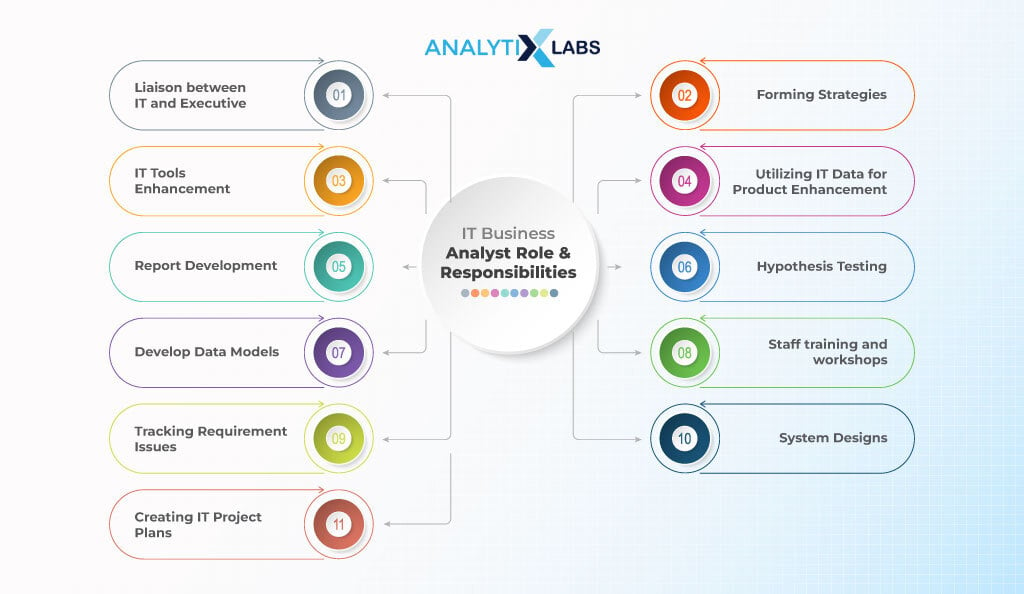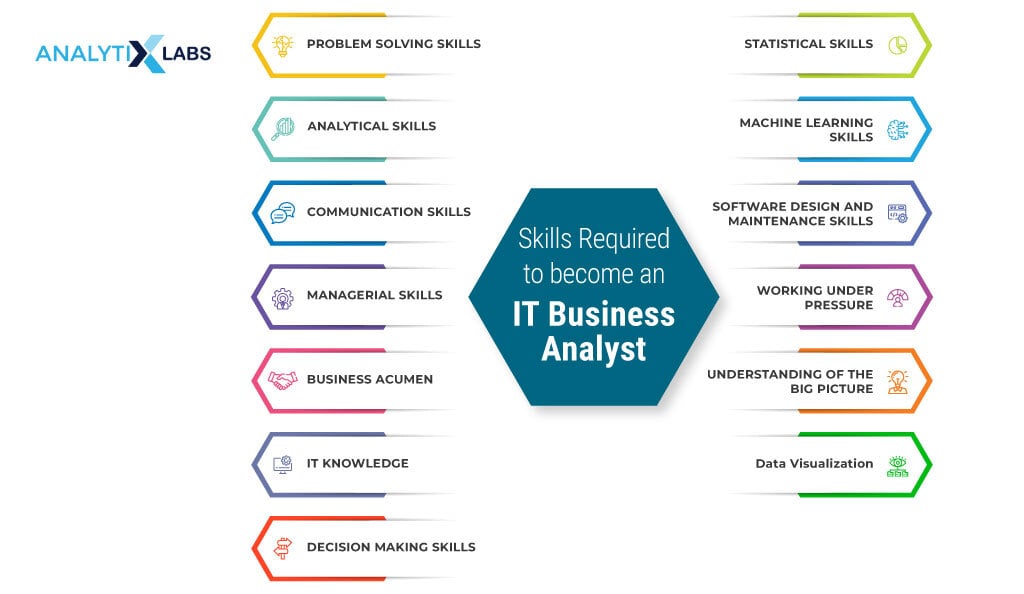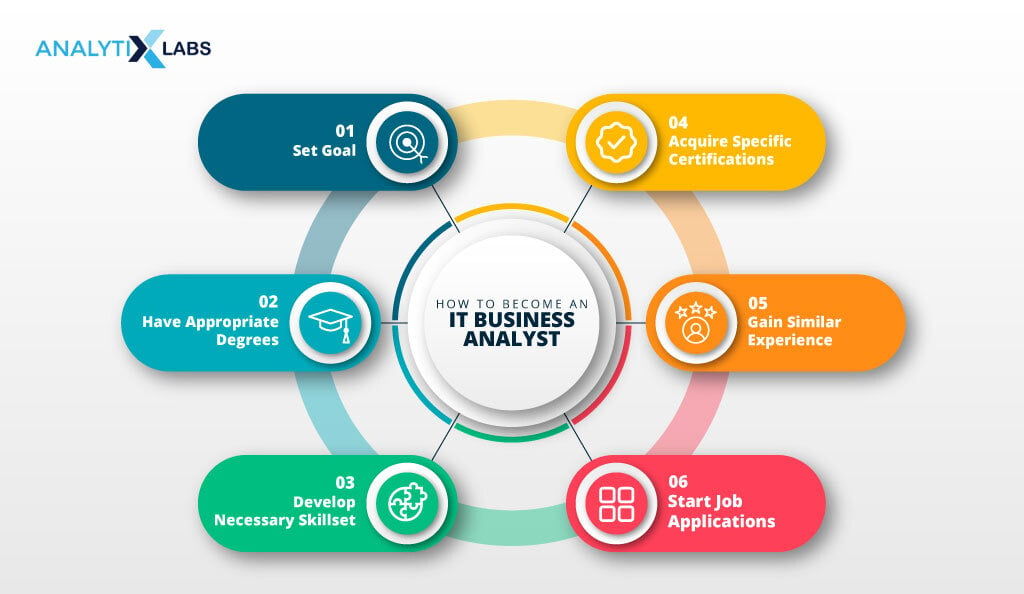Business Analysts are often called “agents of change” as they are responsible for statistically analyzing the data, bringing essential insights to the surface, and providing feedback and suggestions based on it. Today, almost all industries produce precious data that can solve highly complex problems that can be key for the survival of any business.
Given the growing complexity of companies and data and the use of data by every other department in a business organization, there has been a demand for a special kind of business analyst, viz. IT Business Analyst. To begin or boost your career as an IT Business Analyst, get guidance from the best industry experts with AnalytixLabs.
Explore our Business Analytics 360 course and join us for experiential learning that will transform your career. Check out our upcoming batches or book a free demo with us. Also, check out our exclusive enrollment offers
This article will discuss the job description, role, responsibilities, skills, eligibility, and path to becoming a Business analyst in it company.
IT Business Analyst Job Description
A Business Analyst in an IT company is a relatively new concept. To understand the role and responsibilities a business analyst in an IT company performs, you must first have a broad idea of the job description. Companies looking for an IT business analyst describe this role as someone with expertise in information technology and business analytics.
By and large, an IT business analyst makes sure that the quality of the IT products and services is up to date and complements the needs of the business analysts. Therefore, a business analyst in an IT company needs to take care of the infrastructure to enable smooth business analytics operations.
In addition, the business analyst job description typically mentions the individual has the skill of converting the knowledge gained from analyzing the data into a solution that can help IT companies’ product development.
If you now understand the job description for it business analyst, let’s look at the specific responsibilities and role of a business analyst in IT companies.
IT Business Analyst Role & Responsibilities

Role of a business analyst in it company is crucial for effectively analyzing business data. Some of the most critical business analyst roles and responsibilities in it company are the following-
-
Liaison between IT and Executive
The primary role of business analysts in IT companies is to establish communication between the IT department, Business Analysts, and C-level executives. Doing so is highly important as the executives must be aware of the IT executives and business analysts’ situation and the blockers they face.
-
Forming Strategies
IT Business Analysts need to have an in-depth understanding of the business and how data can be leveraged to solve the problems being faced by the company. This is why they are responsible for forming strategies for fetching appropriate data and developing insights that can help solve the problems.
As discussed above, these strategies are to be communicated with the executives so that they can make a business decision to be applied at a large scale.
-
IT Tools Enhancement
Suppose business analysts do not know IT and its related fields like networking, databases, etc. While they may be very good at analyzing data, their potential will be hampered. This is because the IT landscape keeps evolving, and new tools and products keep coming up that can substantially enhance the capabilities of the business analyst.
Similarly, if there is an IT professional, then they might not know about what tools can help their fellow business analysts. This is where the crucial role of business analysts in IT companies becomes relevant. They can keep enhancing the tools available to the business analyst teams as they know both worlds.
-
Utilizing IT Data for Product Enhancement
The data used by the business analyst can come from various sources. If the company is involved in developing IT products, the primary source becomes IT data. This can be in the form of log files or any data generated by the products produced by the company.
In such scenarios, the role of business analysts in IT companies becomes of providing the data to the analytics department and guiding them on how it can be used to develop or enhance the products produced by the IT firm.
-
Report Development
To work coherently, executives and other departments need to understand what is happening in their department and other departments that directly or indirectly affect them and the business at large. This is why report development is considered an essential aspect of the business analyst’s role and responsibilities in an IT company.
Almost in all Business Analyst IT job descriptions, you will find the mention of report development as it can be considered the ‘bread and butter’ of business analysts at large.
-
Hypothesis Testing
It’s very common for business analysts to know statistics as they have to understand the relationships between different datasets and have to understand the data in-depth. To do so, they perform many types of hypothesis testing, including A/B testing.
Also read: Parametric vs. Non-parametric Tests: Which one to use for Hypothesis Testing?
-
Develop Data Models
Business Analyst roles and responsibilities in it company and other companies require them to develop predictive models. These models help companies, including IT companies, to prepare for future events and tweak their strategies accordingly.
Also read: Top 11 Data Mining Techniques
Model development is significant for IT companies as many of their products use predictive models. While there are specialized data scientists and machine learning engineers to do this work, business analysts can also be leveraged (as they know about model development and have better situational awareness of the business).
-
Staff training and workshops
In a job description for it business analyst, you will often see that they require the individual to have good communication and interpersonal skills. While one reason for this is that they need to communicate with the executives and various teams, the other reason is that the nature of their job requires them to provide training constantly.
As mentioned before, IT business analysts ensure that the business analytics department can use the data generated by the IT department and its products. Similarly, the IT department should know how business analysts can use their data and tools.
All of this makes the IT business analyst’s role and responsibility to conduct staff training and workshops. It’s significant as this makes both teams aware of how they complement each other.
-
Tracking Requirement Issues
The departments- IT, which is either taking care of the infrastructure or preparing the products for an IT company, and Business Analytics, which provides business insights or helps enhance the IT products, need each other.
As both these departments need help from each other, there is a need for someone who has knowledge of both domains and can track the requirement issues. This is the responsibility of an IT business analyst.
-
System Designs
IT business analysts also help facilitate better system designs so that the insights gained from the business analytics team can be appropriately leveraged. As business analysts in IT companies are not directly involved in the implementation of software projects, they still need to be kept in touch so that they can make the DevOps department aware of the business requirements and situation.
To do all this effectively, all the systems need to be designed accordingly, and here IT business analyst helps.
-
Creating IT Project Plans
Lastly, when IT projects are being planned, they need to be done in a manner that considers the needs of business analysts. Here the IT business analyst helps as they can tweak the plans so that the interests of business analysts are considered.
I hope your various IT business analyst roles and responsibilities are clear. If you think you want to pursue this role, then let’s look at the skills you need.
Skills Required to Become an IT Business Analyst

There are several skills that IT business analysts need to possess, and this is because they are required to know about both the domains – IT and analytics. The following are the most crucial skills you need to become an IT business analyst.
-
Problem-Solving Skills
First and foremost, you must have good problem-solving skills, mainly because you will deal with various problems that may differ in nature and complexity, requiring you to think outside the box.
-
Analytical Skills
As the name suggests, business analysts analyze the data and form or help form business strategies. To analyze the data, they need to have the right analytics skills that allow them to find the hidden patterns in the data and find those insights that can directly solve the business problems.
-
Communication Skills
The insights gained from the data analysis need to be communicated with the executives and other stakeholders. If not done correctly, even if the insights gained from analyzing the data are significant and crucial, they will be useless if the concerned folks don’t understand what to make out of it. Thus, having good interpersonal communication skills is of high importance.
-
Managerial Skills
IT business analysts need to manage not only one but two domains – IT and business analytics. Having managerial skills is crucial as they must ensure that different teams communicate and understand each other and their requirements. Also, they may deal with various C-level executives, managing their expectations and delivering accordingly.
-
Business Acumen
The broad aim of a business analyst is to find insights from the data that can then be translated into actionable business decisions. When working in an IT company or dealing with the IT department, they need to have the proper business understanding to enhance the IT products or tools to benefit the business.
-
IT knowledge
An IT business analyst unsurprisingly needs to have IT-related skills. This can include knowing networking, data warehousing, software development, etc.
-
Decision-Making Skills
If the IT business analyst has the right business acumen, communication skills, and IT and analytics knowledge, they can help make business decisions. It’s different to suggest something, but when you have to formulate a concrete decision that is to be applied and can significantly change the course of the business, the stakes become high. Having the skills to make the right decision and standing by it is crucial for IT business analysts.
-
Statistical Skills
As mentioned during the roles and responsibilities of IT business analysts, they need to perform hypothesis testing and understand the data at hand deeply. To perform all these responsibilities, a decent understanding of statistics is required.
Thus, you need to know descriptive statistics and various aspects of hypothesis testing, including understanding multiple tests like z-test and t-test. ANOVA, chi-square, etc.
-
Machine Learning Skills
IT Business Analysts often have to forecast and predict events, which requires knowledge of model development. While understanding statistics can allow you to create statistical models, complex problems require the development of machine-learning models.
Thus, it is important to know about various machine learning algorithms, their hyperparameters, model validation, etc.
-
Software Design and Maintenance Skills
The IT department develops various software, which needs to be designed, maintained, and updated to complement the business analytics team. Therefore, knowing software architecture and methods of maintenance is a must.
-
Working under Pressure
Given the nature of the job role, an IT business analyst takes input from multiple places, tracks the deployment of various IT products, deals with issues that business analysts are raising, acts as a liaison between these two departments, etc.
This makes this job a highly stressful one, and one of the critical requirements is to have the ability to work under such a high-pressure environment.
-
Understanding of the Big Picture
While the IT department deals with infrastructure and creates IT-based products, they may not understand where the business is heading. This is where the role of an IT business analyst comes in handy as the business analyst side deals with the business problem, allowing them to have an extensive overview of the issues the business faces.
They then, in turn, make the IT department aware of various business situations, helping them modify their products. To carry out this task, IT business analysts must be able to look at the big picture. IT business analysts also solve structural issues; this big-picture understanding is handy there.
-
Data Visualization
A key responsibility of an IT business analyst is to provide reports to the stakeholders, making them aware of the surroundings and the business at large. To do this effectively, they must create reports that are not just data dumps but visually appealing and easy-to-understand information.
The visualization skill here becomes significant as it allows IT business analysts to represent complex information through simple graphs and charts. While many companies examine the skills mentioned above to decide if you can be granted a job as an IT business analyst, some have specific eligibility criteria discussed next.
IT Business Analyst Eligibility Criteria
As such, one can become an IT business analyst with the required skill set. But certain companies and job roles have some eligibility criteria that the applicants need to take care of. Of the many eligibility criteria, the most common and significant ones are the following-
-
Degree in CS
As an IT Business Analyst, you deal with laying out IT plans and projects and participate in designing, developing, and deploying IT products. Having a degree in computer science is beneficial.
-
Degree in MBA
In the responsibilities and skills section of this article, the importance of management role and skills has been highlighted. This is why companies consider those with managerial degrees even if they do not have a degree in CS.
-
Work Experience in IT Management job role
Having some related work experience can always help. Therefore, some companies require you to have some experience in an IT department, especially in a managerial role, as this can best prepare you for the kind of work you will be performing as an IT business analyst.
-
Certifications in Project Management
If you do not have a computer science or management degree, you can still justify your knowledge by having some certificates in project management. These certificates can be beneficial if you couple them with some work experience in an IT management role or are applying for an entry-level IT business analyst job.
-
Certificants in Relevant Tools
An IT Business Analyst needs to know various tools, including Oracle, Python, Microsoft Access, and SQL. If you can get certificates that help you justify your knowledge of these tools, that can help you secure a job.
Given that the responsibilities, skills, and eligibility criteria are clear, let’s discuss a roadmap to help you become an IT business analyst.
How to Become an IT Business Analyst

If you think the role of an IT business analyst interests you now, then you should follow these six steps to help you become one.
-
Set Goal
The first step is to set your goal and gather all the necessary information. All the fundamental concepts, such as the nature of the job, roles, responsibilities, and skills to properly deliver when working in that job, are a must. This article hopefully helps you cross this step as all these aspects have been covered till now.
-
Have Appropriate Degrees
The next step, if possible, will be to pursue a degree that complements the IT business analyst role and helps make you eligible. As mentioned earlier, the typical degrees you should pursue should be computer science and/or management.
-
Develop Necessary Skillset
The next step is to develop the right skill sets upon getting the degrees. Skills like business acumen, analytical, IT, communication, and problem-solving abilities are necessary.
-
Acquire Specific Certifications
To help you qualify for an IT business analyst role, you can use specific management, IT, and business analytics certifications that cover primary tools like Oracle, SQL, Python, MS Excel, etc.
-
Gain Similar Experience
Your next step should be to get your ‘foot in the door’ that can help you in starting your career. Ideally, you should gain relevant work experience in IT or business analytics, and being in a managerial position will certainly help.
-
Start Job Applications
Lastly, once you have followed all the above steps, you can apply to the companies that offer IT business analyst job roles.
FAQs
- Is IT Business Analyst a good career?
Yes, an IT business analyst is a promising career. You can know about this by looking at the average salaries of IT business analysts worldwide.
- Average Salary in the US: $68K
- Average Salary in India: Rs. 7 Lacs
- Average Salary in the UK: €40K
- What skills does a Business Analyst need?
The vital business analyst skills include problem-solving, analytical, communication, reporting, visualization, etc.
- What does an IT business analyst do?
IT Business analysts work with both the IT and business analytics teams such that both the teams communicate and can help in either enhancing the IT products or leveraging the latest IT technology for business analytics.
- How do I become an IT business analyst?
You can become an IT business analyst with a degree in CS or MBA, analytical skills, and work experience in a managerial position in an IT or analytics department.
I hope this article helped you discover this unique job role of IT Business Analyst. If you have more questions about this field, write back to us.









1 Comment
Lovely just what I was looking for.Thanks to the author for taking his time on this one.